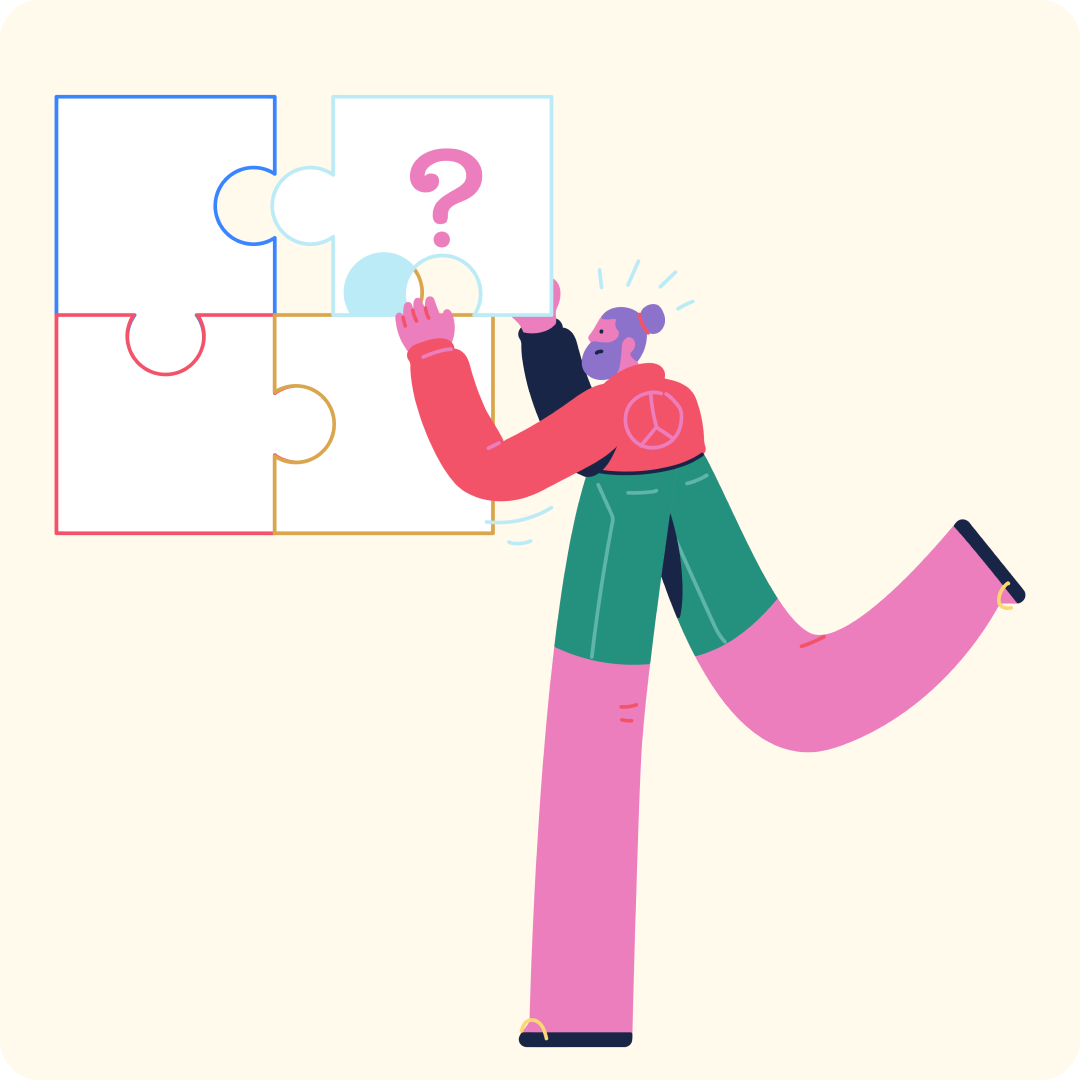'Who Am I?' Worksheet
Download the "Who Am I?" worksheet for your practice
Download free resource
Enter your email below to access this resource.
By entering your email address, you are opting-in to receive emails from SimplePractice on its various products, solutions, and/or offerings. Unsubscribe anytime.

Looking for a “Who Am I?” worksheet? This article explains the self-identity exercise and its benefits, and provides examples of how to explore identity through the “Who Am I?” worksheet PDF.
In addition, you can download a free “Who Am I?” worksheet PDF to save to your electronic health record (EHR).
Therapists can use this “Who Am I?” worksheet to help clients understand themselves and their identities.
What is the ‘Who Am I?’ worksheet?
The “Who Am I?” worksheet is an identity exercise designed to help your clients better understand who they are—traits, core values, roles, and orientations. In other words, our identity.
Identity exploration begins in pre-adolescence and, according to researchers, is crucial to a child’s development and flourishing.
That said, exploring identity is a lifelong process as we move through different stages of life, and our bodies, roles, life experiences, and vocations change over time.
In a therapeutic context, self-identity worksheets, or the “Who Am I?” worksheet, is for anyone looking to explore their identity and achieve clarity about who they are, what matters most to them, and how they want to live authentically.
The downloadable “Who Am I?” worksheet PDF includes a social identity wheel, a personal identity wheel, and the spectrum activity.
Although there are variations in different “Who Am I?” worksheets, they all explore questions of identity and context.
Identity exploration worksheets, including our “Who Am I?” worksheet PDF, typically include the following questions or themes:
- Roles: Our roles change throughout our lives. Roles may include student, daughter, parent, lawyer, homeowner, nurse, doctor, survivor, or dog owner.
- Qualities: Positive traits and qualities may include trustworthiness, reliability, honesty, generosity, kindness, and compassion.
- Skills: This includes things you’re good or skilled at, like carpentry, organization, and synthesizing complex information.
- Social identities: These might include age, race, gender, sexual orientation, health status or disabilities, career or vocation, wealth, and social standing.
- Personal qualities: Includes things you may shy away from, emotions you may show, common responses in certain situations, what motivates you, or what you want out of life.
- Family dynamics: Family identifiers might include meaningful relationships, roles, dysfunction, culture, and family history.
- Outlook: Personal mottos or experiences that have shaped your view of the world.
“Who Am I?” worksheets may ask clients to list qualities in the above categories or prompt them by asking questions, such as:
- What are your greatest skills?
- Name five strengths.
- Which of your identities do you think about most often?
- What matters most to you?
- I do my best when…
- One of my favorite memories was…
- List five things you love to do.
- What is your motivation in life?
- Are there any words or phrases that have helped you to overcome challenges?
Benefits of using identity exploration worksheets
Identity worksheets are a helpful tool for therapists for several reasons:
- Enhanced self-awareness: “Who Am I?” worksheets can help clients get clarity and a cohesive sense of self.
- To build self-esteem: Helping clients acknowledge what they’ve overcome or challenges they’ve faced and their unique skills and qualities shows clients their resilience and builds self-esteem.
- Values-alignment: The “Who Am I?” worksheet PDF can support clients in identifying their core values and ways they find meaning in their lives to make decisions in a more values-aligned way.
- As a basis for more in-depth therapy: “Who Am I?” worksheets can set a helpful foundation for other modalities, like the internal family systems model (IFS), or to identify resources for treatment, like eye movement desensitization and reprocessing (EMDR).
- Treatment: Exploring various roles and transitions, like divorce parenting, can help to cope with life challenges.
- Community building: Self-identity exercises, like the ones included in the “Who Am I?” worksheet PDF, can be used as an icebreaker in social and academic settings to help students get to know each other and bond over similarities.
Other types of identity worksheets for therapy
There are various types of “Who Am I?” worksheets that can be used in a therapeutic context, including:
- Social identity wheel or personal identity wheel: Encourages students to reflect on their social and personal identities, how they describe themselves, and identify what matters most to them.
- Boundaries exploration worksheet: Helps clients identify personal limits and rules.
- Self-esteem completion worksheets: Supports clients in exploring negative self-perception and their positive attributes to build self-esteem.
- Money beliefs and behaviors assessment: Allows clients to explore the meanings behind their money-related behaviors and uncover sources of stress.
Sources
- Guo, S., Cheung, C. K. J., Hu, J., Ning, X. (2021). The moderation effect of identity exploration and basic psychological needs satisfaction on flourishing of Chinese rural children.
- Kłym, M., & Cieciuch, J. (2015). The Early Identity Exploration Scale-a measure of initial exploration in breadth during early adolescence.
- Sugimura, K., Gmelin, J.-O. H., van der Gaag, M. A. E., & Kunnen, E. S. (2021). Exploring exploration: Identity exploration in real-time interactions among peers. Identity: An International Journal of Theory and Research.
- University of Michigan. (n.d.). Social identity wheel.
How SimplePractice streamlines running your practice
SimplePractice is HIPAA-compliant practice management software with everything you need to run your practice built into the platform—from booking and scheduling to insurance and client billing.
If you’ve been considering switching to an EHR system, SimplePractice empowers you to streamline appointment bookings, reminders, and rescheduling and simplify the billing and coding process—so you get more time for the things that matter most to you.
Try SimplePractice free for 30 days. No credit card required.

